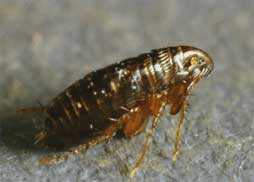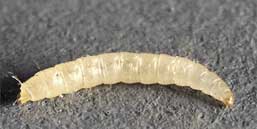Fleas Infest Pets and Homes
-- Fleas can be both irritating and dangerous --
Summary: Adult fleas (Siphonaptera) are obligate blood-sucking ectoparasites of warm-blooded animals (mammals and birds), including humans. Flea larvae, on the other hand, are worm-like and develop in the host animal's nest feeding on dried blood and other organic debris. Flea bites cause itchy red lesions and may also transmit important diseases to both us and our pets. This series of articles discusses how to identify adult fleas and flea larvae, flea development and flea control in homes and on pets.
Common misspelling: flee, flees, dog flee, cat flee
Flea identification
Fleas are small (1/10"-1/5"), wingless insects that are flattened side to side, brown to nearly black in color. Larval fleas are creme-colored, worm-like and live in the host animal's "nest", or bedding. Flea larvae do not bite but rather feed on organic debris and dried blood provided by adults.
The laterally flattened shape helps adult fleas move between the hairs of their host animal. Fleas can jump when disturbed.
You may find "flea dirt" in your pets fur before you notice the adult fleas. Flea dirt is dry flea feces, mostly dried blood. Flea dirt will dissolve in water and turn the water red. This is another good reason to regularly brush or comb your pet and be on the lookout for fleas and flea dirt. Early detection is the key to successful flea control in homes.

Flea development (life cycle)
The basic flea life cycle is pretty simple. Eggs are laid in the host animal's nest (pet bedding) or fur. Eggs hatch in about a week. Worm-like flea larvae feed on organic debris and feces from adult fleas and after two to three weeks fully grown larvae pupate in a silken cocoon. After one or two weeks as pupae adult fleas are ready to emerge but this is where things may get interesting (at least to an entomologist!).
Flea pupae (the stage between larvae and adults) need a stimulus in order to emerge as adult fleas. Most of the time they need to detect the vibrations made by a host animal. In the absence of the vibration stimulus the pupae can become inactive and wait for a host animal for months. This explains why an apartment that has been empty for months can suddenly spring to life with fleas when a new tenant moves in and their activity stimulates adult fleas to emerge from their cocoons.
A pandemic disease spread by fleas
Fleas have also had an important and surprising impact on human history. At least three Plague pandemics have been caused by a flea-transmitted pathogen called Yersinia pestis. The pathogen is transmitted from rodents to humans through flea bites. The rat flea, (Xenopsylla cheopis) is an important vector of this pathogen.
Flea control treatments and products
Homeowners can now safely and effectively treat flea infestations with simple-to-use topical medications combined with insect growth regulators that prevent flea larvae from becoming adults. While relatively expensive the medications are so effective that no one, nor any pet, should have to tolerate fleas any longer. Take a look at Safely Eliminating Fleas in Homes and On Pets for details regarding these treatments.
If you are considering a flea collar for Fido or Miss Puss you may want to take a look at our article Do Flea Collars Work? (Spoiler alert: most work better against ticks than they do against fleas!)
Supplies
Professional-level pest control supplies are generally not available in home and garden stores but can be found at DoMyOwn, our affiliate.

How to search 'Bugs for more information
The easiest way is to open a Google search page and type: "your query" + site:livingwithbugs.com into the search box. For example, to find all 'Bugs articles about carpenter ants type: carpenter ants + site:livingwithbugs.com in the search box.
The resulting list of pages may contain some Google advertising (marked with "Ad" next to the URL) as well relevant pages from 'Bugs. The ads do not originate with 'Bugs.